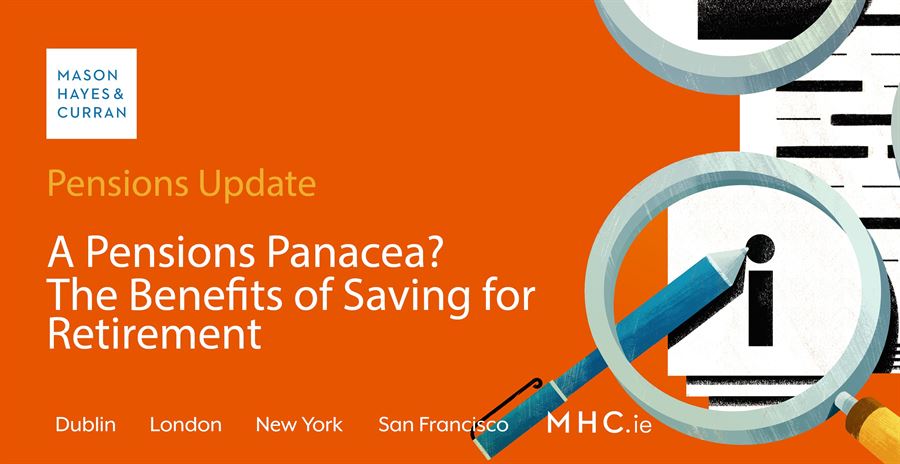A Pensions Panacea? The Benefits of Saving for Retirement
 The European Central Bank has maintained a negative rates policy since 2014 to manage a period of protracted economic weakness caused initially by the last recession. The adoption of this policy means that banks across the EU have been penalised for holding surplus reserves and have begun to pass this cost on to deposit account holders. Due primarily to pandemic caution, Irish savers have put away some €13.4 billion in the twelve months ending in November 2020. However, depositing surplus cash with a financial institution is not the only option available to savers with an eye on their future and retirement. For anyone in pensionable employment or self-employed, a pension provides an excellent investment and saving opportunity especially given the tax exemptions available.
The European Central Bank has maintained a negative rates policy since 2014 to manage a period of protracted economic weakness caused initially by the last recession. The adoption of this policy means that banks across the EU have been penalised for holding surplus reserves and have begun to pass this cost on to deposit account holders. Due primarily to pandemic caution, Irish savers have put away some €13.4 billion in the twelve months ending in November 2020. However, depositing surplus cash with a financial institution is not the only option available to savers with an eye on their future and retirement. For anyone in pensionable employment or self-employed, a pension provides an excellent investment and saving opportunity especially given the tax exemptions available.
Tax relief on earnings
Relief on member pension contributions is provided as an age-related percentage limit. For instance, if you are under 30 you may claim relief on up to 15% of your earnings in any one year. If you are between 30 and 39 you may claim relief on up to 20% of your earnings and so on.
The State pension
As well as the tax relief provided there is the State pension to consider. At €12,912 per annum, it is likely to be a fraction of many workers annual earnings come retirement. If the State pension is not supplemented by adequate private pension income, it will lead to a dramatic change of lifestyle come retirement. Astonishingly, over half of the current Irish workforce do not contribute to a pension and will only have the State pension to rely on in retirement. As banks begin to apply negative rates to long and medium term deposit accounts, a pension is an excellent tax efficient vehicle for investing in asset classes other than cash as well as providing for retirement.
Forecasts for 2021
While admitting that there is still “extraordinary uncertainty” on economic outlooks, the IMF anticipates global growth of 5.5% for 2021. This upgrade from its last forecast is due to the start of vaccination programmes in many countries and the return to normality as the health crisis abates. Most financial analysts are expecting 2021 to develop as a post-recession recovery phase of the economic cycle. This means an extended period of low-interest rates and low-inflation. As deposit accounts are likely to produce a negative return for the foreseeable, pension investors have a range of other asset classes to choose from. These options can boost returns while benefitting from an exemption from capital gains and dividend income tax.
Assets
Members of defined contribution schemes will typically have a number of fund choices available to them which can be selected according to risk appetite. Equity funds of varying risk levels will be provided by most asset managers. Despite the downturn in equity markets in March of last year an equity fund investor will have made significant gains to December 2020 with the S&P 500 up 16.26% and the FTSE All-World Index up 14.4% for the year. Those in single member pensions such as PRSAs or small self-administered schemes have an even greater range of asset choices available. They can directly invest a large percentage of their available funds in buy-to-let residential property, commercial property and private equity. The benefits of having a pension as well as the option for making additional voluntary contributions are very clear.
The future for life and pensions
It is expected that 47% of the Irish population will be aged 65 and over by 2050, this is more than double what it is today. For the EU as a whole those over 60 are expected to exceed 32% of the population by the same year. This means fewer working people to support spending on healthcare and state pensions. This reality, coupled with a negative rates environment has led to an increased focus on life and pensions in the financial services industry. This can be seen most recently by a proposed life and pensions joint venture between AIB and Irish Life. We can expect this trend to continue as the need for private pension provision as well as sustainable investment returns comes into focus.
We are likely to see negative rates on cash for some time to come. Approaching a financial advisor to discuss pension provision and the asset classes available, as an alternative to depositing cash with a bank, makes a lot of sense. While there are arguably too many product options available for consumers in the pensions market, the recent recommendations of the Interdepartmental Pensions Reform and Taxation Group may go some way towards simplifying single member pensions. Automatic enrolment is also in the pipeline and is to be welcomed as it has had a very successful introduction in the UK with 10 million more people now saving for retirement.
For more information, please contact a member of our Pensions team.
The content of this article is provided for information purposes only and does not constitute legal or other advice.
Share this:




